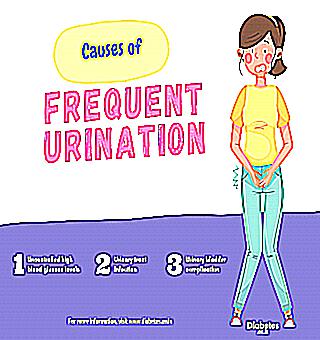Home >
Erectile Dysfunction >
Causes of intermittent urination in the male population
Causes of intermittent urination in the male population

Intermittent urination in men and incontinence are common bladder problems. This condition can affect men of all ages. In most men, it is caused by an enlarged prostate, the result of certain medications, infections, surgery, or nervous system disorders.
There are some therapies that relieve intermittent urination, but you need to see your doctor as soon as symptoms occur. Only a doctor can determine the true causes of the disorder and prescribe treatment.
Reasons
There are many reasons for intermittent urination. In men, this condition is usually associated with the prostate gland, but it can also be caused by disorders of the nervous system, surgery, infections, or even psychological problems.
Enlarged prostate
This is one of the most common pathologies in the male population. It affects 5-10% of men in their 40s, about 60% of men over 60 and up to 80% of men between the ages of 70 and 80! In most men, the prostate gland enlarges with age. The swelling puts pressure on the urethra, which carries urine out of the body, making it difficult to urinate or holding back the flow of urine.
From a symptomatic point of view, the patient reports a decreased, often interrupted urinary flow and an increase in the number of micturitions, especially at night. You may also have an urgent need to urinate, dripping, and a feeling of incomplete emptying of the bladder after you have finished urinating.
Infections
Like other organs in the body, the prostate is also infected with infections. Prostatitis, or inflammation of the prostate gland, is very rare in children and adolescents, but mostly in young and adult men. In the elderly, it is often associated with prostatic hypertrophy. Prostate Infection: Causes?
The main reasons can be divided into:
- Sexual transmission. After intercourse, the infected microorganisms reach the prostate through the prostate gland. This case is often associated with an infection of the urethra or urethroprostat.
- Urine reflux. In other cases, prostatitis can be caused by reflux of urine contaminated due to concomitant pathological changes in the urethra or prostate gland.
Pharmacological therapy
Certain medications can cause urinary problems in men of all ages. Medications that cause this side effect include some cold medications, nasal medications, and allergy medications. Intermittent urination can also double or be caused by anticholinergics used to treat stomach cramps, muscle cramps and urinary incontinence, and some antidepressants.
Stones
Urinary tract stones: These are minerals that can accumulate at different points in the urinary tract. They may remain asymptomatic, especially during the first phase of their formation, but they can also cause severe pain if they obstruct the flow of urine. Other symptoms associated with stones include blood in the urine, painful or frequent urination, nausea and vomiting.
Disorders and injuries of the nervous system
Any injury or nerve disorder may affect the flow of urine. Nerves can be damaged by accident, stroke, birth, diabetes, or a brain or spinal cord infection. People with multiple sclerosis and babies born with a nervous system disorder can also experience traumatic nerve damage that causes urinary problems.
Surgical interventions
Anesthesia given during surgery can "disturb" some nerves, causing subsequent difficulty urinating
Thin bladder syndrome
The presence of frequent stimuli to urinate can be caused by reasons of a psychological nature. This is due to the action of the sympathetic nervous system, which, under stress, anxiety, cold, activates, stimulates the production of urine.
In other cases, however, it can have the opposite effect, that is, the so-called "urophobia" or "shy bladder", a psychological disorder that includes the inability to urinate in front of others can prevent a person from starting "their own business" or maintaining urination in certain situations. After all, "forking" means sacrificing oneself.
Home Treatment
Heat can help treat urinary problems. Place a hot water bottle on your lower abdomen, between your navel and your pubic bone. Heat relaxes muscles and can improve urine flow. You also need to drink plenty of fluids.
Help
When urinating intermittently, it is recommended to see a doctor. Thanks to the examination and the necessary clinical tests, the doctor will be able to determine the causes of the disorder and prescribe treatment that will alleviate the existing symptoms.
You should immediately seek emergency medical attention if you are unable to urinate due to vomiting, fever, chills or back pain. This problem is called urinary retention and causes swelling. If left untreated, it can lead to serious consequences.
Purpose
In case of difficulties with urination, the doctor first conducts an objective examination. Then he asks several questions in order to find out how long the man has had intermittent urination, when it gets worse, how often the stream is bifurcated if the urine flow is weak, and how it worsens or improves. The doctor should also be aware of the symptoms, any medications or supplements that are currently being taken.
After the examination, the physician may order tests to determine why the jet is split. The test may include a urine sample. The doctor also prescribes an ultrasound, which allows you to get an image of the prostate. It is a technique that uses sound waves to produce an image of this gland.
Undesirable consequences
If problems with urination are ignored, then with a split jet, symptoms can only worsen. Urination can be so difficult that it can cause a lot of pain. This can result in urinary retention, which is considered an emergency. It is advisable to see a doctor with the first symptoms.



























